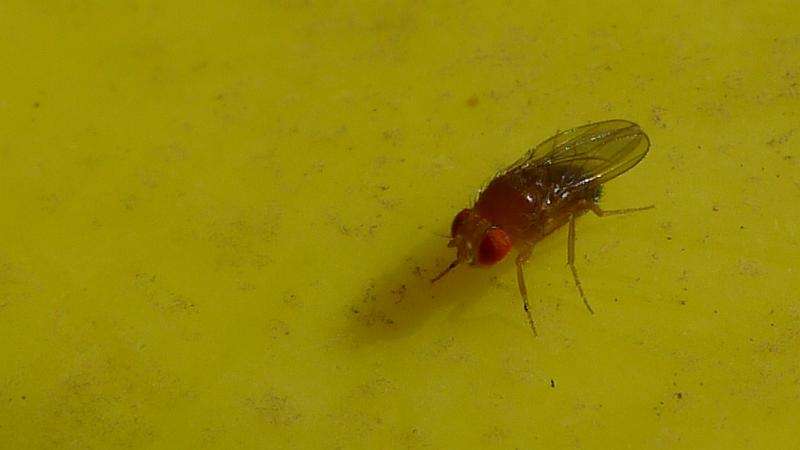July 1, 2015 report
Dopamine found to increase sexual desire in aging male fruit flies

(Medical Xpress)—A team of researchers with affiliations to a large number of institutions in Taiwan has found that increasing dopamine levels in the brains of male fruit flies caused them to find a renewed interest in sexual activity. In their paper published in the journal Nature Communications, the team describes their study of natural and artificial levels of dopamine in male fruit flies and its impact on sexual interest and activity.
With most species, the researchers note, interest in engaging in sexual activity wanes with age—in addition to experiencing physical degradation, many also find a decrease in libido. In humans, drugs such as Viagra can help with the former, but offer little to remedy the latter. In this new effort, the researchers report that their efforts have shown that causing an increase of dopamine in a certain part of the fruit fly brain, can cause a male fly to become more amorous.
The researchers began their study by tracing natural levels of dopamine in protocerebral posteriolateral dopaminergic cluster PPL2ab neurons in male fruit fly brains, noting that as the fly aged (from ten to fifty days) levels began to drop along with a decreased interest in engaging in sexual courtship rituals. They then repeated their analysis after giving some fruit flies L-DOPA, a precursor for the synthesis of dopamine. Doing so, the team reports caused the males to become reenergized as they once again found interest in pursuing females. To make sure that it was not due to a change in how the females responded to the males that had more dopamine in their brains, the researchers offered the males females that had been decapitated—preventing them from responding in any way—the results remained the same.
The fruit fly brain is far less complex than that of humans, of course, but prior research has found that dopamine levels also play some role with the libido in human males—feeding them L-DOPA as a treatment for Parkinson's disease, for example, often has a side effect of causing compulsive sexual behavior. Much more research will have to be done before it can be determined if such treatments might be helpful for an aging human population.
More information: PPL2ab neurons restore sexual responses in aged Drosophila males through dopamine, Nature Communications 6, Article number: 7490 DOI: 10.1038/ncomms8490
Abstract
Male sexual desire typically declines with ageing. However, our understanding of the neurobiological basis for this phenomenon is limited by our knowledge of the brain circuitry and neuronal pathways controlling male sexual desire. A number of studies across species suggest that dopamine (DA) affects sexual desire. Here we use genetic tools and behavioural assays to identify a novel subset of DA neurons that regulate age-associated male courtship activity in Drosophila. We find that increasing DA levels in a subset of cells in the PPL2ab neuronal cluster is necessary and sufficient for increased sustained courtship in both young and aged male flies. Our results indicate that preventing the age-related decline in DA levels in PPL2ab neurons alleviates diminished courtship behaviours in male Drosophila. These results may provide the foundation for deciphering the circuitry involved in sexual motivation in the male Drosophila brain.
© 2015 Medical Xpress



















